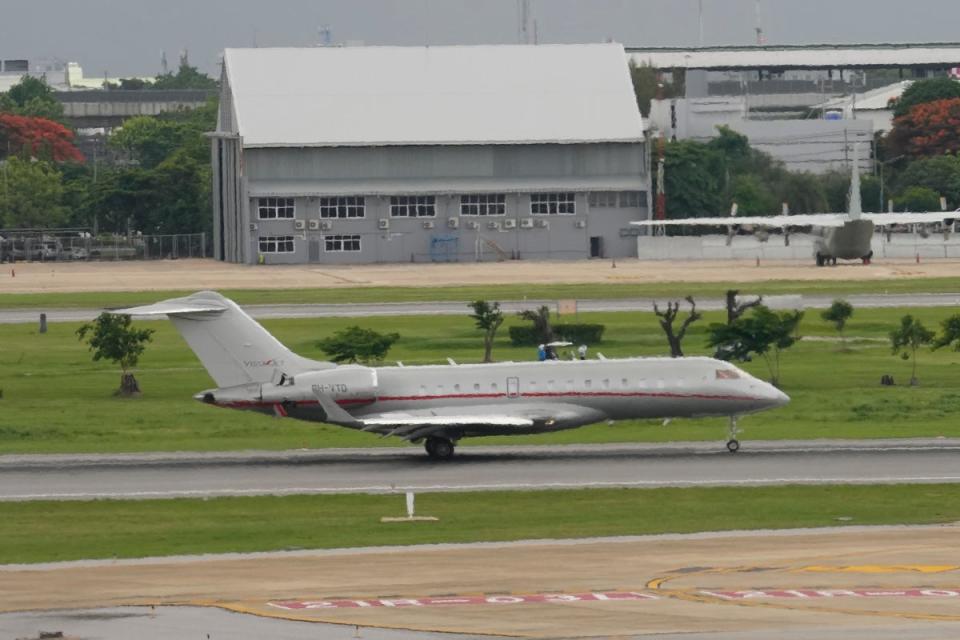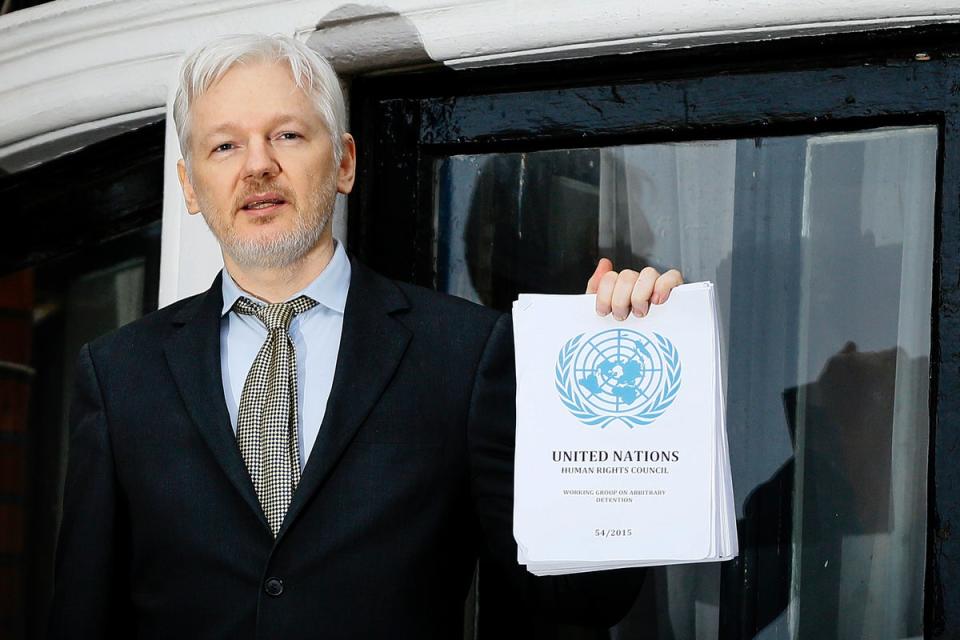Julian Assange has left Britain after agreeing a plea deal with the US that will see him plead guilty to criminal charges and walk free.
The WikiLeaks founder was granted bail by the High Court and released from Belmarsh Prison on Monday after negotiations with US authorities.
Court papers filed by the US Department of Justice show Assange is scheduled to appear in federal court to plead guilty to charges under the Espionage Act of conspiring to illegally obtain and disseminate classified national defense information.
It happened after the publication of hundreds of thousands of leaked documents related to the wars in Afghanistan and Iraq.
He will return to his home country of Australia after his plea and sentencing, scheduled for Wednesday morning local time in the Mariana Islands, a US colony in the western Pacific.
A chartered plane carrying Assange left Stansted Airport on Monday before landing at Bangkok airport for refueling at midday local time (6am BST) on Tuesday.
His wife Stella Assange told the PA news agency that he is paying $500,000 for the flight to Australia.
His father John Shipton said his freedom was a “great burden” on his family.
In a statement posted on X, WikiLeaks’ official account said Assange left the maximum security prison on Monday “after spending 1901 days there”.
The statement continued: “He was granted bail by the High Court in London and released at Stansted airport this afternoon, where he boarded a plane and left the UK.
“This is the result of a global campaign that has included community organizers, press freedom campaigners, legislators and leaders across the political spectrum, all the way to the United Nations.
“This created space for a long period of negotiations with the US Department of Justice, resulting in a deal that has not yet been formally finalized.”
A video posted by WikiLeaks to X showed Assange, sitting and dressed casually in jeans and a shirt, discussing the text on a sheet of paper.
He is then shown walking up the steps onto a Vista Jet aircraft.
Speaking on Assange’s release, Australian Prime Minister Anthony Albanese told the nation’s parliament on Tuesday “we want to bring him home to Australia”.
julian assang free,
Julian Assange free. He left Belmarsh maximum security prison on the morning of June 24, after spending 1901 days there. He was granted bail by the High Court in London and released at Stansted airport in the afternoon, where he boarded…
— WikiLeaks (@wikileaks) June 24, 2024
He said: “I have been very clear as both Labor and opposition leader, but also as prime minister that – regardless of what people think about Mr Assange’s activities – the case has been drawn face for too long.
“There is nothing to be gained from his continued incarceration and we want to bring him home to Australia.”
Mr Albanese added that Australia’s diplomatic forces are “in Australia’s interest and advocating for Australia’s interest using all appropriate means to support a positive outcome”, a role he assumed early on after being elected. as prime minister in 2022.
He added: “I will have more to say when these legal proceedings are concluded, which I hope will be soon, and I will report as appropriate at that time.”
The WikiLeaks statement also thanked “everyone who stood with us, fought for us, and remained fully committed in the fight for their freedom”.
He said: “After more than five years in a 2 x 3 meter cell, isolated 23 hours a day, he will be reunited with his wife Stella Assange, and their children, who only know their father from behind bars.
“WikiLeaks has published groundbreaking stories of government corruption and human rights abuse, holding them accountable for their actions. As editor-in-chief, Julian paid a lot for these principles, and for people’s right to know.

“As he returns to Australia, we thank everyone who stood with us, fought for us, and remained fully committed in the fight for his freedom. Julian’s freedom is our freedom.”
In a separate post on X, Miss Assange said: “Julian is free!!!!
“Words cannot express our immense gratitude to you – it is YOU, who have come together for years and years to make this happen. THANK YOU. thank you. THANK YOU.”
She later posted a picture of her speaking to Assange on the phone in front of the Sydney Opera House.
“Julian drove into Sydney from Stansted airport last night (during the day),” she wrote.
Assange’s mother, Christine Assange, told Australia’s Sky News that she is “grateful” that her son’s persecution is “coming to an end”.
She said: “This shows the importance and power of quiet diplomacy. Many people used my son’s case to push their own agenda, so I am grateful to those unprecedented and hardworking people who put Julian’s best interests first.
“The last 14 years have obviously taken a toll on me as a mother, so I want to thank you in advance for respecting my privacy.”
Former British ambassador to Uzbekistan Craig Murray said Assange’s family are “thrilled” at his release, telling Sky News: “It’s been very taxing. It’s no secret, having spent so many years in a maximum security prison.
“Why in the world is a person who is a journalist, who has never harmed anyone in his life, locked up in a prison with the worst terrorists in the UK … it is very difficult for anyone to defend him.”
His father said recent court hearings in the UK gave him hope that the “tide was turning” in his son’s favour, as well as increased pressure from the Australian government.
He said he hoped his son would spend time “walking along beaches and listening to birds” in the coming weeks and months.
“I was aware that something was changing from the behavior of the court over the last few hearings, particularly with the concerns raised by the judges,” Mr Shipton said.
“I did not give up hope, I did not despair that this day would come. I am very happy – it is as if a huge burden has been lifted.”
Assange has been locked in a long legal battle in the UK over his extradition, which saw him live in the Ecuadorian Embassy in London in 2012 before being held in Belmarsh prison.
In a January 2021 ruling, then-district judge Vanessa Baraitser said Assange should not be sent to the United States, citing a real and “suicidal-like” risk, and ruled against him on all other issues.


Later that year, US authorities won a High Court bid to overturn this block, paving the way for Assange’s extradition.
Assange was due to bring his own challenge before the High Court in London in early July after he was recently granted permission to challenge the original judge’s dismissal of parts of his case.
Assange has been in custody at HMP Belmarsh for more than five years, fighting a long legal battle against extradition to the United States.
In a court order released on Tuesday, Dame Victoria Sharp and Mr Justice Johnson said Mr Assange left the jurisdiction of England and Wales at 6.36pm on Monday, after signing a plea agreement on 19 June.
The judges also said that he “expects that a plea will be entered and accepted on Wednesday, June 26, 2024, after which the United States has promised to withdraw the extradition request”.
They also said that Assange’s lawyers and the US authorities would have to provide an agreement document related to the pending extradition appeal proceedings on Friday afternoon.
The Crown Prosecution Service said a bail hearing for Assange was held in private last Thursday.
Stephen Parkinson, director of public prosecutions, said: “Thirteen and a half years and two extradition requests after he was first arrested, Julian Assange left the UK yesterday, following a bail hearing last Thursday, which was held to private on request.
“I am proud of the way our extradition unit handled this case. They acted with expertise and skill, under international scrutiny, to provide legal advice to both the Swedish and US authorities.
“This case has taken a significant amount of time and resources from the criminal justice system over many years. The plea agreement will result in achieving the primary objective of delivering justice. It will also save the continued expenditure of substantial resources associated with further litigation on this matter in England.”
John Sheehan, head of extradition at the SPC, said: “This was a very complex matter involving advising and representing the Swedish and US authorities. In this period, the CPS extradition unit faced and dealt with novel and challenging legal issues. Mr. Assange also took advantage of all the legal protections available to him.
“This resulted in facilitating the necessary arrangements to enable Mr Assange to leave the UK legally and safely.”